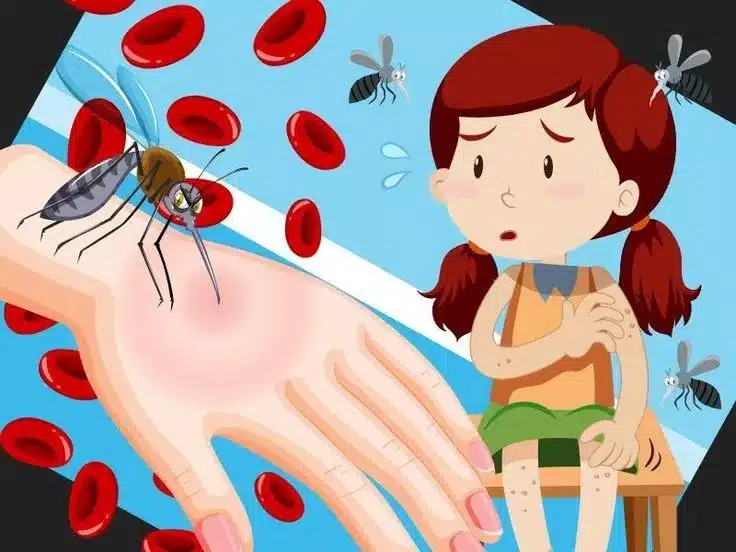Overview
Contents
Malaria is a mosquito-borne infectious disease that is caused by the bite of a female mosquito and affects both animals and humans.
In 2019, there were about 229 million cases of malaria worldwide, and the estimated were death is 4 lakh.
It can also become a life-threatening disease if it is not treated properly. so take precautions, especially after the monsoon.

What Is Malaria?
It is an infectious disease that is caused only by the bite of a female mosquito called (Anopheles).
Pregnant women who are infected by it can pass this disease to their child at the time of birth, hence it is known as congenital malaria.
What Happens After In Our Body When Malaria Mosquito Bites?
It is a deadly disease that spread through the bite of an infected female mosquito because infected mosquito salvia contains a parasite called plasmodium vives.
When the mosquito bites us it parasite is enter our bloodstream from where it travels to the liver, where they mature, after a few days, then this parasite starts to infect our RBC.
Then within 2 to 3 days, this parasite starts to multiply from inside the RBC, due to which the infected cells burst. as a result, its symptoms start appearing.
What Reason For Malaria?
It is caused by lady mosquitoes which release their salvia in our bloodstream, through which it spreads through our body.
In humans, this mainly caused by 5 kinds of plasmodium include:
- Plasmamodium falciparum
- P. ovale
- P. malariae
- P. knowlesi
- Plasmodium vivax
P. falciparum is the most common species and is responsible for the majority of deaths.
Although p. vivax is quite dangerous, evidence has shown that p. vivax is associated with potentially life-threatening conditions.
Does Malaria Spread?
No, it doesn’t spread from person to person, through sexual contact, cold, or flu.
But it can be spread, if you do this, which includes:
- Organ transplant
- From pregnant women to their unborn baby
- Share needles
- Blood bondings
Their spread also depends on climate conditions which can significantly affect mosquito colonies and survival such as – rainfall, humidity, and temperature.
And it is most visible after the rainy season because water fills all the places and there they lay their eggs.
Symptoms of Malaria
Its symptoms usually start appearing b/w 10 to 26 days, these common symptoms are:
- Flu
- Weakness
- Joint pain
- High fever, night sweating
- Headache
- Chills
- Haemoglobin in the urine
- Vomiting
- Diarrhea
- Stomach pain
- Nausea
The most severe type is – Falciparum, in which symptoms may appear 10 to 30 days after infection. which include:
- Difficulty in turning the eyes in one direction
- Anemia
- Muscle pain
- Coma
- Blood in stool
- Abnormal posturing
NOTE: But Its symptoms can also appear later in people who have taken antimalarial medications as prevention.
World Malaria Day
World malaria day is celebrated for its prevention and control of it. it was established in 2007 by the WHO member states through the special health assembly.
The 2021 world malaria day theme is – “Reaching the zero malaria target“
According to WMR 2019, India represents alone 3% of the global malaria burden, India sees a 50% reduction in malaria cases and deaths by 49% as compared to 2017.
Malaria In Children

Children, especially those under 5 years, are more prone to this disease, and dengue, so make sure that there is no carelessness about the child.
In 2018, malaria is the cause of 67% of death in children globally.
Children have not yet developed the necessary immune system to protect against disease compared to adults, so they are at higher risk of malaria, and dengue.
Learn More About – Home-remedies For Dengue.
The clinical symptoms in children are:
- trouble in breathing
- Cough
- vomiting
- Fever
- Eating behavior change
This symptom can also be due to minor colds, and flu, so make sure to take the child to the children’s doctor.
What Tests to diagnose malaria?
There are many tests for diagnosing malaria, and the doctor will ask you about your medical history, then recommend you test inlclude:
Antigen-based test: This test is done for the rapid screen test for more people. also gives negative, and positive reports in 1 to 2 hours.
Blood test: This test is more reliable than a rapid test, but its report comes in 1 to 2 days.
Any Precaution Before Test?
- Generally, its Prefare that, tests should be given before taking any medicine for malaria.
- If the patient has a fever, then it would be better to give the sample at that time.
- Sometimes, the test can also come negative, therefore, after 1 to 2 days, the test may have to be done again.
Treatment of Malaria
Its treatment depends on what type you have for example:
If a person has uncomplicated malaria, then antibiotics, and anti-malarial therapy is given.
If a person has falciparum type, it is a serious condition, in this, you will have to be admitted to the hospital.
Normally chloroquine is the most common medicine used for malaria, but now chloroquine resistance has increased a lot. so now other drugs are used.
- Artemoesinin
- Derivatives
- Artemether
- Lumifantrine
NOTE: Malaria drugs can be given to you as a vaccine and by mouth.
Who is At More Risk?
People who are at high risk of it are:
- Young children, and babies
- older people, due to – weak immune system
- pregnant women
- people who live in rural areas
- travellers, especially coming from countries where there is no malaria.
People experiencing health problems are more prone to malaria.
- Diabetes
- Immunity compromise people like cancer, HIV
- Liver, and kidney issues
- Heart patients
- High blood pressure
Prevention Tips
There is no vaccine available to prevent malaria, but you can protect your family from this infection in some ways including:
- Wear full slives clothes, especially for children, and in the rainy season.
- Use insect repellent
- If you are camping, use an insect screen tent.
- Sleep under the mosquito net, which is a very easy and effective way to prevent mosquito bites.
Vaccine
According to the Oxford University report in 2021, the R-21 Matrix-m vaccine demonstrated an efficacy of 77% within 1 year.
The vaccine became the first vaccine to meet the WHO vaccine technology Roadmap goal with at least 75% efficacy.
In 2015, there is a vaccine against malaria called (RTS, S). it works against P. falciparum malaria which is the deadliest type globally.
It is most prevalent in Africa and is largely given in 4 doses to each child, result 4 out of 10 malaria cases were prevented in the 4-year period of the vaccine.
Down Line
Pregnant women who are infected by it can pass this disease to their child at the time of birth, hence it is known as congenital malaria.
It is caused by lady mosquitoes which release their salvia in our bloodstream, through which it spreads through our body.
The 2021 world malaria day theme is – “Reaching the zero malaria target“.


How to make money online – earnings with investment https://sites.google.com/view/site-for-investing-in-bitcoin/how-to-make-money-online-earnings-with-investment
One other thing I would like to mention is that instead of trying to suit all your online degree lessons on days of the week that you conclude work (considering that people are tired when they get back), try to obtain most of your classes on the week-ends and only a couple courses in weekdays, even if it means a little time off your weekend break. This is fantastic because on the weekends, you will be far more rested plus concentrated for school work. Many thanks for the different guidelines I have mastered from your weblog.